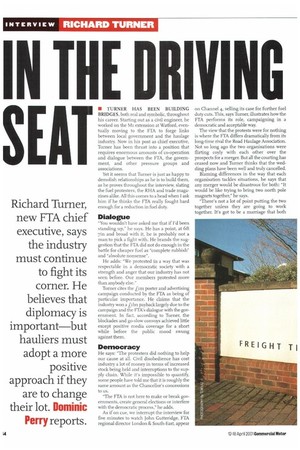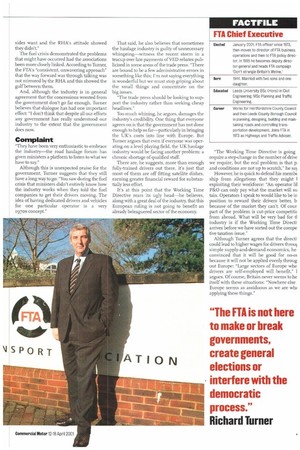N THE RIVING SEAT
Page 46

Page 47

If you've noticed an error in this article please click here to report it so we can fix it.
Richard Turner, new FTA chief executive, says the industry must continue to fight its corner. He believes that diplomacy is important—but hauliers must adopt a more positive approach if they are to change
their tot. Dominic Perry reports.
• TURNER HAS BEEN BUILDING BRIDGES, both real and symbolic, throughout his career. Starting out as a civil engineer, he worked on the MI extension at Watford, eventually moving to the FTA to forge links between local government and the haulage industry. Now in his post as chief executive, Turner has been thrust into a position that requires enormous amounts of co-operation and dialogue between the FTA, the government, and other pressure groups and associations.
Yet it seems that Turner is just as happy to demolish relationships as he is to build them, as he proves throughout the interview, slating the fuel protesters, the RHA and trade magazines alike. All this comes to a head when I ask him if he thinks the FTA really fought hard enough for a reduction in fuel duty.
Dialogue
"You wouldn't have asked me that if I'd been standing up," he says. He has a point, at 6ft 7in and broad with it, he is probably not a man to pick a fight with. He brands the suggestion that the FTA did not do enough in the battle for cheaper fuel as 'complete rubbish" and "absolute nonsense".
He adds: "We protested in a way that was respectable in a democratic society with a strength and anger that our industry has not seen before. Our members protested more than anybody else."
Turner cites the Lim poster and advertising campaign conducted by the FTA as being of particular importance. He claims that the industry won a fibn payback largely due to the campaign and the FTA's dialogue with the government. In fact, according to Turner, the blockades and go-slow convoys achieved little except positive media coverage for a short while before the public mood swung against them.
Democracy
He says: "The protesters did nothing to help our cause at all. Civil disobedience has cost industry a lot of money in terms of increased stock being held and interruptions to the supply chain. While it's impossible to quantify, some people have told me that it is roughly the same amount as the Chancellor's concessions to us.
The FTA is not here to make or break governments, create general elections or interfere with the democratic process," he adds.
As if on cue, we interrupt the interview for five minutes to watch John Gutteridge, FTA regional director London & South-East, appear on Channel 4, selling its case for further fuel duty cuts. This, says Turner, illustrates how the FTA performs its role, campaigning in a democratic and acceptable way.
The view that the protests were for nothing is where the FTA differs dramatically from its long-time rival the Road Haulage Association. Not so long ago the two organisations were flirting coyly with each other over the prospects for a merger. But all the courting has ceased now and Turner thinks that the wedding plans have been well and truly cancelled.
Blaming differences in the way that each organisation tackles situations, he says that any merger would be disastrous for both: "It would be like trying to bring two north pole magnets together," he says.
"There's not a lot of point putting the two together unless they are going to work together. It's got to be a marriage that both sides want and the RHA's attitude showed they didn't" The fuel crisis demonstrated the problems that might have occurred had the associations been more closely linked. According to Turner, the ETA's "consistent, unwavering approach" that the way forward was through talking was not mirrored by the RHA and this showed the gulf between them.
And, although the industry is in general agreement that the concessions wrested from the government don't go far enough, Turner believes that dialogue has had one important effect "I don't think that despite all our efforts any government has really understood our industry to the extent that the government does now.
Complaint
They have been very enthusiastic to embrace the industry—the road haulage forum has given ministers a platform to listen to what we have to say," Although this is unexpected praise for the government, Turner suggests that they still have a long way to go: "You saw during the fuel crisis that ministers didn't entirely know how the industry works when they told the fuel companies to get their drivers moving. The idea of having dedicated drivers and vehicles for one particular operator is a very 19705 concept." That said, he also believes that sometimes the haulage industry is guilty of unnecessary whingeing—witness the recent storm in a teacup over late payments of VED rebates publicised in some areas of the trade press. "There are bound to be a few administrative errors in something like this; I'm not saying everything is wonderful but we must stop griping about the small things and concentrate on the big issues.
"The trade press should be looking to support the industry rather than seeking cheap headlines."
Too much whining, he argues, damages the industry's credibility. One thing that everyone agrees on is that the government has not done enough to help so far—particularly in bringing the UK's costs into line with Europe. But Turner argues that even if everyone was operating on a level playing field, the UK haulage industry would be facing another problem: a chronic shortage of qualified staff
There are, he suggests, more than enou fully-trained drivers out there, it's just that most of them are off fitting satellite dishes, earning greater financial reward for substantially less effort.
It's at this point that the Working Time Directive rears its ugly head—he believes, along with a great deal of the industry, that this European ruling is not going to benefit an already beleaguered sector of the economy. "The Working Time Directive is going require a step-change in the number of drive we require, but the real problem is that p, and conditions are not up to scratch," he sa3 However, he is quick to defend his memb( ship from allegations that they might 1 exploiting their workforce: "An operator hI P&O can only pay what the market will su tam. Operators I speak to would like to be in position to reward their drivers better, b because of the market they can't. Of cour part of the problem is cut-price cornpetitic from abroad. What will be very bad for tl industry is if the Working Time Direct. arrives before we have sorted out the compe tive taxation issue."
Although Turner agrees that the directi. could lead to higher wages for drivers throul simple supply-and-demand economics, he convinced that it will be good for no-on because it will not be applied evenly throug out Europe: "Large sectors of Europe whe drivers are self-employed will benefit," l argues. Of course, Britain never seems to he itself with these situations: "Nowhere else Europe seems as assiduous as we are win applying these things."
































































































